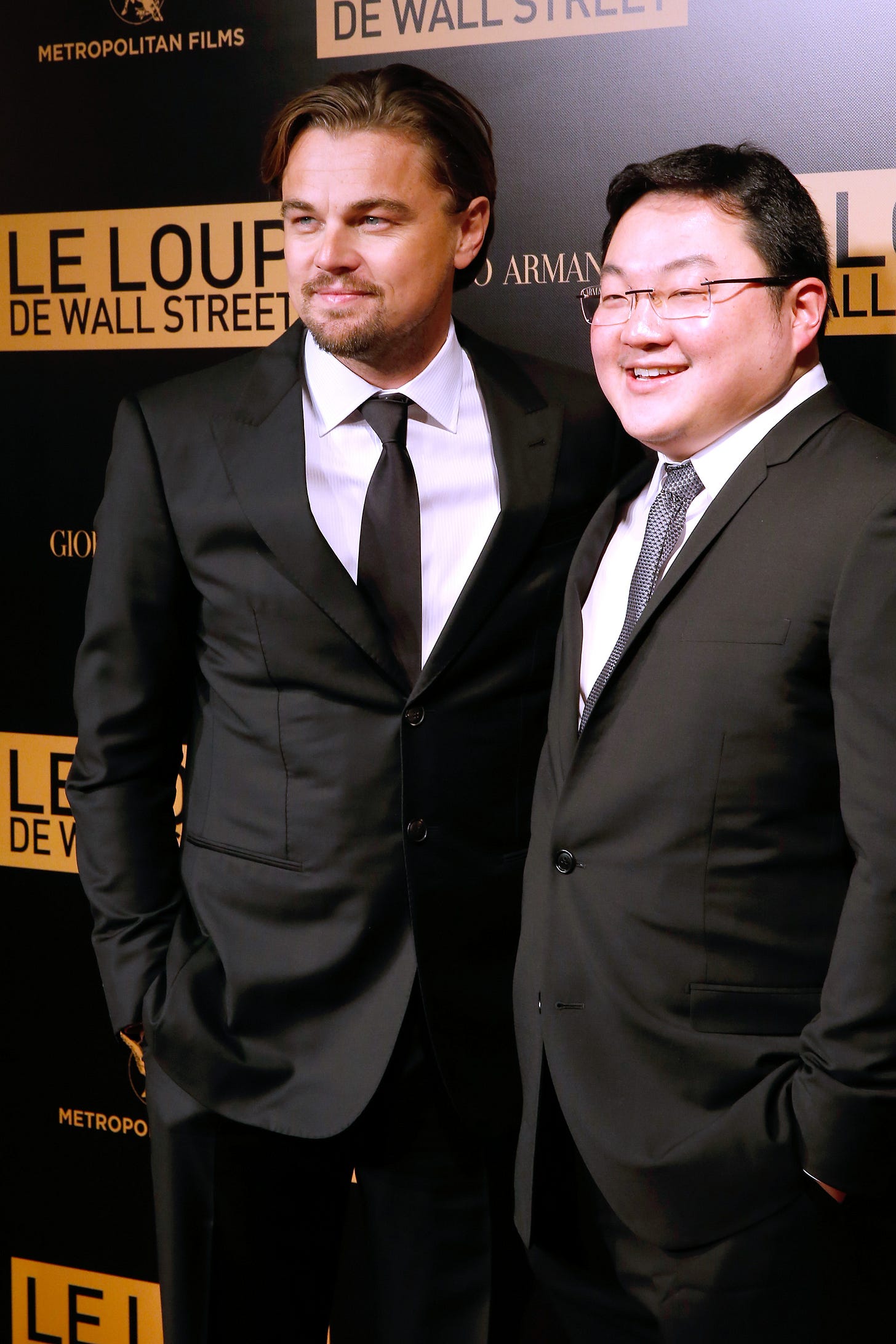'Dumb Money' comes up short
The film, which dramatizes the GameStop short squeeze of 2021, finds heroism in an unearned place. Plus: a new documentary explores Malaysia's wild 1MDB scandal.
Director Craig Gillespie seems to have a weakness in his movies for making heroes out of people who really weren't all that heroic.
His I, Tonya tried to rehabilitate the image of figure skater Tonya Harding who, while certainly a compelling figure, almost certainly took part in a conspiracy to maim her top rival. Next up was a Disney movie, Cruella, which tried to find previously unseen humanity in a character best known for trying to murder puppies.
His new film, Dumb Money makes much the same mistake, only from the opposite direction. He takes a story in which a group of people were seen in the popular imagination as scrappy underdogs, and doesn't really do anything to question or interrogate that. And really, he should have.
In case you're not familiar with the story: In the pandemic-depth days of the winter of 2020-2021, a little-known YouTuber known as Keith Gill (sometimes called "Roaring Kitty") began to talk up the stock of GameStop, the struggling mall retailer widely seen as passé and past its prime. Kitty actually had a theory of the case for why GameStop was undervalued, and it soon gained purchase from the denizens of a Reddit forum called WallStreetBets.
That interest from what is known as "retail investors" — often using the upstart investing app known as Robinhood — began to make a dent in the short positions of a group of hedge funds, costing them billions of dollars. This led to a "short squeeze," a battle of wills in which the people who shorted the stock and those who are buying it are simultaneously driving up the price, and it's a question of who blinks first. At one point, Robinhood cut off sell orders, either because they couldn't cover that amount, or perhaps because of pressure from hedge fund Citadel. (The truth remains somewhat ambiguous to this day, although there's likely some truth in both.)
The story is a fascinating one that kept the rapt attention of finance types and hobbyists alike, during those awful pandemic months. The film portrays the hedge fund guys (Seth Rogen as Gabe Plotkin, Vincent D'Onofrio as Steven Cohen, and Nick Offerman as Ken Griffin), probably accurately, as cartoonish and greedy villains. The two Robinhood founders (Sebastian Stan and Rushi Kota) are presented as particularly craven and amoral.
But it's the WallStreetBets side of the movie that's the problem. Paul Dano plays Roaring Kitty as a blue-collar guy from Brockton, Mass., who appears to have launched the whole thing with good intentions. But we also see the arcs of some of his followers: A nurse (America Ferrera), a GameStop employee (Jorge Ramos), and a collegiate lesbian couple (Myha'la, from Industry, and Talia Ryder).
None of these people have much money, to begin with. But all of them put all the money they do have (and luckily much more than that) into this single stock while committing to hold it indefinitely. All of them have family members or other loved ones warning them to sell, but all refuse. We're led to believe that all would've been fine had the hedge funds and Robinhood not intervened.
This is…all wrong. Betting it all on one stock is never a smart or responsible investing strategy, and neither is having a rigid ideological commitment to holding the stock, no matter what happens. To imply, as the movie does, that these people are entitled to have their strategy pay off and never have the stock go down, is just laughable.
Roaring Kitty himself actually claimed to have a theory of the case as to why GameStop was undervalued. But as for the other people… they seemed to just be riding the wave, driven by memes, as well as pressure from strangers on the internet.
The phenomenon has a lot in common with something else that was coming to a head around the same time, cryptocurrency, and later the even more ridiculous scam that was NFTs. These were all financial instruments that were pushed by very unscrupulous people appealing to those with an unhealthy, get-rich-quick mentality.
A couple of excellent but depressing recent documentaries, Tribeca's This is Not Financial Advice and last month's The Highest of Stakes, have looked at the cults that have grown around crypto- also driven by guys with YouTube channels and dumb nicknames, and with an aesthetic and attitude nearly identical to that of the GameStop meme stock crew. (The GameStop meme stock saga, incidentally, has already been the subject of at least three documentaries, just in the two years since it happened.)
Dumb Money isn't all bad. The film ably captures what that era of the pandemic was like. There are some decent performances, especially by the three hedge fund baddies; Offerman and Rogen don't play villains often, but they're both quite convincing here, and fans of the New York Mets will enjoy the depiction of that team's owner, Cohen, as a vulgarian who has a literal pig following him around his estate. (Bobby Axelrod, the antihero of Billions, is allegedly based on Cohen, but D'Onofrio's take appears much closer to the mark.)
Pete Davidson gives a successful comic relief performance as Kitty's ne'er-do-well brother, the world's least responsible DoorDash driver, while it's great to see long-ago actress Olivia Thirlby — back in the news, recently, due to some eyebrow-raising stuff in Elliot Page's memoir — show up as Rogen's wife.
The film, though, isn't nearly as propulsive or exciting as a typical episode of Billions, much less the likes of The Wolf of Wall Street or even The Social Network. Both the latter movie and Dumb Money are adapted from books by author Ben Mezrich, and two guys who figured in the action in the Facebook movie, Tyler and Cameron Winklevoss, are executive producers here, along with Mezrich. I have not read his GameStop book, but I can say that Mezrich's book about Facebook, The Accidental Billionaires, is one of the worst nonfiction books I've ever read and that it resulted in a quality movie is a testament to the oft-maligned talents of Aaron Sorkin.
The approach of The Big Short, another movie about complex finance that succeeded creatively, was sitting right there: The film clearly established that the banks were villains and acted horribly, but it didn't exactly make Michael Burry or Steve Eisman into heroes who we're supposed to root for. They were right, and that was enough.
I do give Gillespie credit for avoiding his usual habit of on-the-nose needle drops; instead, Dumb Money leans heavily on "W.A.P." and other such pussy-centric hip-hop anthems, because, you see, the guy's nickname was "Roaring Kitty," and cat/pussy puns – and much, much more vulgar stuff than that, which the movie barely touches — was a staple of the WallStreetBets subreddit.
—
And speaking of major financial controversies of recent vintage… not everyone knows about the 1MDB scandal, but it's so wild everyone absolutely should.
Long story short, a guy named Jho Low (pronounced "Joe Low," much like Yolo) managed to gain control of the Malaysian sovereign wealth fund, and stole from it, to the tune of a reported $4.5 billion. Low, in addition to schmoozing with the Malaysian elite, also went to the United States and befriended lots of stars like Leonardo DiCaprio, Kim Kardashian, and Miranda Kerr. And by "befriended" I mean he gave them millions of dollars in gifts, including Marlon Brando's old Oscar for Leo. You may have heard recently that Pras Michel, from the Fugees, is going to prison; that, too, was in connection with the scandal.
Perhaps the best detail? Low ended up an investor in Martin Scorsese's The Wolf of Wall Street, which was itself a movie about exceptionally sleazy financial malfeasance. Low threw a party for the movie at the Cannes Film Festival that was so lavish, even by Cannes standards, that the film's subject, Jordan Belfort, noted at the time that it must have been paid for with stolen money.
Low is the topic of a new documentary called Man on the Run, because Low is, in fact, on the run- which means, of course, that he wasn't available to be interviewed, although the makers of the recent Apple documentary on Carlos Ghosn did sit down with that CEO-turned-fugitive in his exile in Lebanon.
The book Billion Dollar Whale, by Wall Street Journal reporters Tom Wright and Bradley Hope, was the definitive account of the scandal, and it goes into a bit more depth than the documentary does. But the film does make one thing clear: A lot of the time, a guy with a bunch of money shows up, and when that happens — whether it's a social setting or a roster of people producing a movie — people tend not to ask too many questions.
The doc does focus on the tragedy of what happened to Malaysia after billions were stolen from them, although it does show one great detail: After Lho financed The Wolf of Wall Street, there was so much pride in Malaysia that the movie was shown in the country's schools. It's hard to imagine a less appropriate movie than The Wolf of Wall Street, to be shown in schools.








"This is…all wrong. Betting it all on one stock is never a smart or responsible investing strategy, and neither is having a rigid ideological commitment to holding the stock, no matter what happens. To imply, as the movie does, that these people are entitled to have their strategy pay off and never have the stock go down, is just laughable."
I saw it differently. To me, I thought the film made it very clear that what the retail investors in GameStop were doing was very obviously foolish, and not something to emulate or attempt in one's own life. But just because it's foolish doesn't mean it won't/didn't work.
And I never perceived the idea that they were "entitled to have the strategy pay off". That it did pay off (for most, but not all, of the retail investors) strikes me as a matter of "they wouldn't have made this movie if everybody was wiped out".